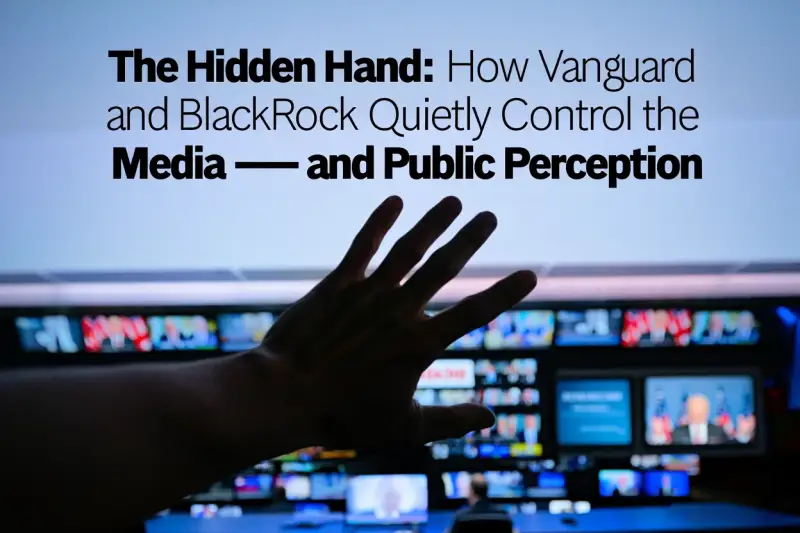By David N. Harding, Staff Writer

The Illusion of Media Independence
In today’s America, citizens are promised a marketplace of ideas — a free and independent press where competing views battle for public opinion. Yet, behind this comforting illusion lies a chilling truth: two colossal financial firms — The Vanguard Group and BlackRock — quietly control the vast majority of major media companies.
This unprecedented consolidation of ownership threatens the very foundation of a healthy democracy: the open and unbiased flow of information. If we are serious about protecting free speech, conservative values, and the integrity of our republic, it's time to pull back the curtain.
Who Really Owns the Media?
An objective review of public filings and ownership records reveals a stunning concentration of media control.
According to Morningstar Ownership Reports, Vanguard and BlackRock are the top two institutional shareholders in nearly every major media entity, including:
-
The Walt Disney Company (Morningstar Disney Ownership)
-
Comcast Corporation (NBC, MSNBC, Universal) (Morningstar Comcast Ownership)
-
Warner Bros. Discovery, Inc. (CNN, HBO, Discovery) (Morningstar Warner Bros. Discovery Ownership)
-
Paramount Global (CBS, MTV, Comedy Central) (Morningstar Paramount Ownership)
-
Fox Corporation (Fox News, Fox Broadcasting) (Morningstar Fox Ownership)
-
Netflix, Inc. (Morningstar Netflix Ownership)
-
The New York Times Company (Morningstar NYT Ownership)
-
News Corp (Wall Street Journal, New York Post) (Morningstar News Corp Ownership)
-
Meta Platforms, Inc. (Facebook, Instagram, Threads) (Morningstar Meta Ownership)
-
Alphabet Inc. (Google, YouTube) (Morningstar Alphabet Ownership)
-
Amazon.com, Inc. (Washington Post) (Morningstar Amazon Ownership)
The implications of this cannot be overstated: the same two companies sit atop the entire information supply chain, influencing everything from Hollywood storytelling to news headlines to search engine results.
Why This Matters: The Ramifications of Media Consolidation
1. The Death of Real Competition in News and Ideas
When Vanguard and BlackRock hold stakes across "competing" outlets, the incentive to allow truly divergent narratives disappears.
Competition of ideas — the engine of democratic society — is replaced with cautious, consensus-driven messaging.
This helps explain why coverage across CNN, MSNBC, ABC, CBS, and even Fox News often mirrors one another on key issues like climate change, immigration, elections, and pandemic policy.
2. The Quiet Suppression of Dissent
When ownership is centralized, dissent becomes dangerous.
Major platforms like YouTube (Alphabet) and Facebook (Meta) have repeatedly censored or deplatformed conservative voices, often under vague standards of "misinformation."
This shift narrows the range of acceptable public debate and artificially manufactures the appearance of consensus.
3. The Weaponization of ESG and Progressive Agendas
Both Vanguard and BlackRock aggressively push Environmental, Social, and Governance (ESG) frameworks across their investment portfolios.
This transforms major corporations — including media companies — into political actors advancing progressive agendas.
As BlackRock CEO Larry Fink candidly admitted, the firm uses its financial leverage to "force behaviors" around diversity, equity, and climate policy (Fox Business, 2022).
"You have to force behaviors, and at BlackRock, we are forcing behaviors."
— Larry Fink, CEO of BlackRock
In a free society, behaviors are shaped by values, not by coercion from trillion-dollar investment giants.
4. Selective Outrage, Manufactured Consent
Media coverage today is engineered to drive selective outrage.
For example:
-
Measles deaths — which are extraordinarily rare (three deaths in 2025 according to the CDC) — receive relentless media coverage.
-
Meanwhile, medical errors — the third-leading cause of death in America, killing over 250,000 annually according to Johns Hopkins Medicine — receive minimal coverage.
This disparity isn't accidental — it's strategic.
By controlling which issues spark outrage, media elites control how the public allocates its attention, energy, and votes.
Control Without Accountability
The concentration of media control among Vanguard and BlackRock represents one of the greatest threats to free discourse in American history.
These firms are not news organizations. They are private asset managers whose primary objective is wealth preservation and political influence — not truth-telling or accountability.
According to SEC Filings, Morningstar Ownership Reports, and MarketScreener Institutional Holdings, Vanguard and BlackRock own significant stakes across media, social media, big tech, and entertainment sectors.
Yet the public has no mechanism to check or challenge their growing influence over the American mind.
In effect, control of the narrative has been privatized — handed to unelected financial titans whose political and cultural goals rarely align with the will of everyday Americans.
Conclusion: Conservatives Must Build a Parallel Economy of Information
If freedom of speech and a competitive marketplace of ideas are to survive, conservatives must:
-
Create and support alternative media outlets that operate outside corporate influence
-
Invest in platforms that champion free speech and resist ESG-driven conformity
-
Demand greater transparency around media ownership and conflicts of interest
-
Reject ESG compliance as the new cultural and corporate religion
The battle for America's future will not be fought only at the ballot box.
It will be fought over who controls the information we receive, the conversations we have, and the truths we are allowed to tell.
The good news?
Awareness is rising — and where there is awareness, there can be resistance.
It’s time to break free from the illusion of choice — and build an information economy rooted in liberty, truth, and courage.
#MediaOwnership #FreeSpeech #Vanguard #BlackRock #MediaBias #CorporateControl #ParallelEconomy #IndependentMedia #FreedomOfInformation #ESG #ConservativeVoices #BuildNotBeg #BreakTheMonopoly



Add comment
Comments